October 27, 2011
3 Minute Backstories - Stained Glass
Recently uploaded to Youtube - short backstories of 2 people who happen to be connected to stained glass, though in quite different ways.
1 - Promo testimonial for the Fulbright Scholarship, but providing insight into the background of Medieval Scholar Dr Meredith Parson Lillich.
2 - Family and studio history from David Judson, of Judson Stained Glass Studios, in California
It makes me wonder - if you took 15-20 people who work in stained glass, from different backgrounds and disciplines, and did 3 minute backstories, what would it be like?
October 25, 2011
QRazy Glass, part 1a - 11 ideas
While you are waiting for me to get to the "QRazy Glass, part 2" blog post (may take another week or so), here is a link with more ideas for using QR codes -
11 creative and unique uses of QR Codes
October 14, 2011
Patrick Reyntiens on Coventry Cathedral
A video From Goldmark Gallery, who represents Patrick Reyntiens.
[update - December 11, 2011 - Two additional videos, from an opening of an exhibiton of Patrick Reyntien's work, in honor of his 86th birthday.
Patrick Reyntiens Exhibition 3rd December 2011 - Preview
Patrick Reyntiens - 'Stained Glass' Exhibition - Opening 2011]
October 13, 2011
Handmade In Britain � Britain's Most Fragile Treasure
The documentary about the stained glass of York Minster, Britain's Most Fragile Treasure, aired last night in the UK. Possibly never to be seen in the USA, due to "Rights Agreements". Yeesh. Such is the indominable contrariness of the BBC in collusion with the American TV powers that be. Anyway.
To coincide with this, the York Glaziers Trust has set up a new York Glazier's Trust website, and it is quite impressive.
One interesting development I noticed is that the 'YGT' now has a conservation studio with real live stained glass conservators on view. I am curious to see how that develops. I'll keep my eyes and ears open for any first hand accounts.
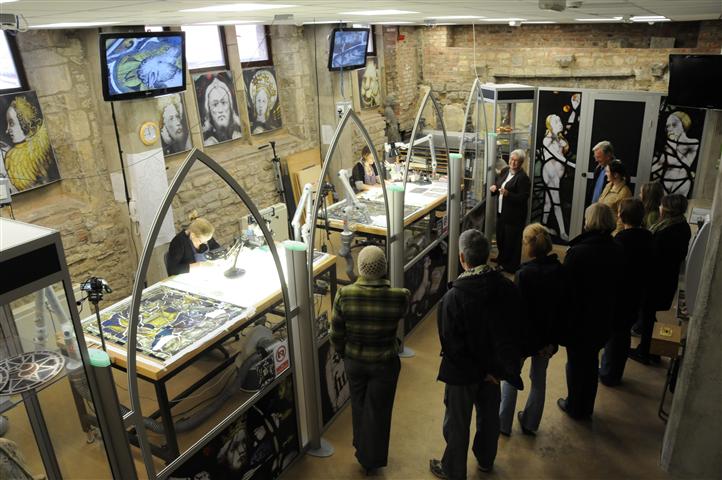
I believe the director, Sarah Brown, is the one conducting the group in the above picture. I met Sarah when she did a talk at the 2010 AGG concerence in Detroit. Nice lady, extremely knowledgable, and very dedicated to both the conservation of stained glass and the education of future stained glass artists and conservators.
They do great work there and I wish them the best of luck, especially in these austere times.
[update October 21, 2011 - this might be temporary, but Britain's Most Fragile Treasure is on YouTube now]
October 11, 2011
QRazy Glass, part 1
I finished this panel last July, making it to show friends at the AGG conference in Asheville. It's my first, and so far only, attempt at incorporating QR (quick response) 2D barcodes into a stained glass panel.
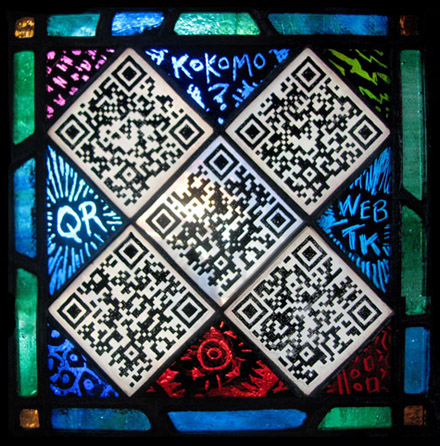
Below the fold, in part 1, I'll do a brief intro to the QR code and have links to a variety of projects using QR codes - in art, illustration, and public monuments, and in uniquely creative public signage.
In the next few days I'll post part 2, where I go over how I made the prototype panel, and how to make your own QR code and some of the unique issues raised by trying to incorporate it into stained glass.
What is a QR code?
Basically, it's an image that can be read by a smartphone that will instantly call up text, link directly to websites, get contact information placed straight into your phone, upload images, go to map locations, and more. For more detailed info on its history and background - QRcode wikipage). More interesting to me than the technical details is how might these interactive codes be used in art, illustration and architecture? Is it worth the extra effort? Could it be more than a passing fad? My own interest was sparked in a similar way to this comics artist who found out about the QR code by visiting City Museum in St. Louis - How to Get a Quick Response from your Comic Book Customers
How can I read a QR code?
QR codes are mostly read with a smartphone or tablet with a camera. There are many readers available for free download, in all types of smartphones. Go to your app store and search for "QR reader" and many free apps will show up. I have 6 different QR readers on my phone, all for free. Red Laser, Qrafter and 2DSense seem to work the best on my iPhone. I've heard Zxing is best for Android phones, since Zxing comes from Google itself.
You can also decode a QRcode by submitting an image of it to this Zxing Decoder. It will give you the underlying text or link.
QR Code Projects in the News
These are some of the more interesting projects I've heard about that incorporate QR codes. I'll add more as I hear of more.
Arbor Day Event with QR codes, Central Park New York, 2010
World Park Campaign, Central Park, NYC, Arbor Day 2010
Tattoo Artist and Animation Mashup Using QR Code
Tattoo Artist tattoos QR code linked to Animation
Balloon QR code Illustration for Magazine Cover
NY Times Magazine cover, December 2010
click to enlarge image, scan to go to New York Times "year of ideas" website.
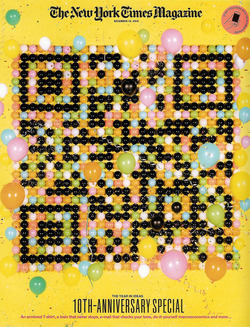
The most amazing thing to me about this is how well the code can scan when it is so roughly formed, with balloons no less!
QR Code Quilt
QR Code Quilt by Rubi McGrory out of Savannah, Georgia
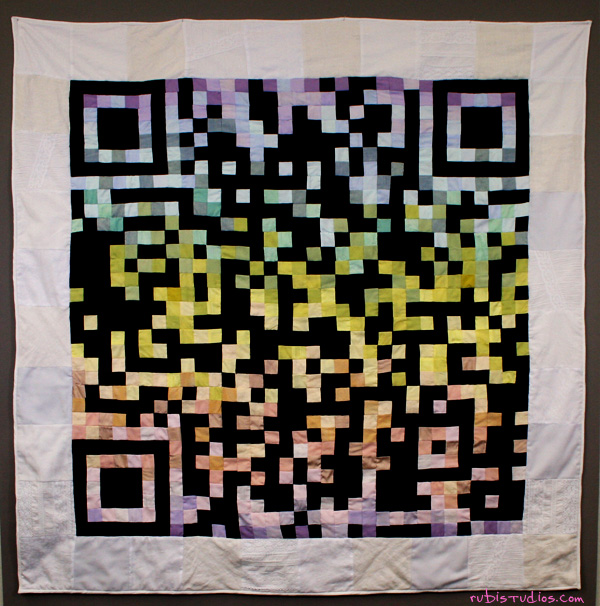
The encoded text message is nice, but hardly seems worth the effort of encoding it in a QR code in the first place.
QR Code links to Memorial Website on Tombstone
This creeps people out a bit. Understandable, it's a cemetary. Still, I could see a similar idea coming into use in memorial stained glass windows.
QR Code on Tombstone Creates Dynamic Memorial. The QR code links to a memorial website.
(via Mashable)
QR Codes in Ceramic Tilework
The nature of the QR code would seem to lend itself especially to the medium of ceramic tiles. Here are 2 examples -
A QR Code Link with the Past, with a QR code done in ceramic tile as part of a larger figural sculpture.
Talking about iBarga is a tourist campaign for a medieval town in Italy. The city itself has QR codes throughout explaining the different sites to see, with audio guides and website information linked to the QR codes. The QR codes are fired into ceramic tiles and installed permanently. A video about the project.
In the next few days I�ll post more specifically about my stained glass QR project and how QRcodes might be incorporated in future stained glass projects.
In the meantime, one more thought to ponder...
Is there already a QR backlash?
There are naysayers, especially in the world of advertising/marketing, as in this article - Death to the QR Code. The reality is that this might be a fad and the technology could disappear in the next decade, or the next 2 years. Or it could hang on. Everything tends to cycle very quickly in computer and internet technology, often gauged in months rather than years. Did you know that QR codes are not a new thing but are making a comeback (just one example - QR codes making a comeback with Wikipedia?).
What will happen once the novelty wears off? How long will it take for the technology to be totally supplanted by something else? Will there be any way to read these in 10 years? 20? 50?
How much does it matter?
October 06, 2011
RIP Steve Jobs (1955-2011)
This is a picture I posted on this blog way back in 2004.
From the old 'Cult of Mac' section of the Wired website -
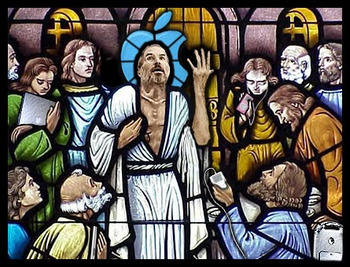
My first visit to a Macworld Expo was in 1985 (in Paris, France!), just a year after the Mac was introduced. I was truly hooked when I first saw Photoshop on the Mac at a Boston Macworld Expo in 1991. I got my first Mac in 1992 and never looked back. I think I'm on my 6th or 7th one now.
Thank you, Mr. Jobs. Sad to see you leave the stage far too soon.
October 04, 2011
Surviving Your Creativity
Calling all Bostonians!!
Judith Schaechter is giving a lecture called Surviving Your Creativity at MIT tomorrow, October, 5th, 2011.
Sounds interesting. Wish I could be there.
click to enlarge
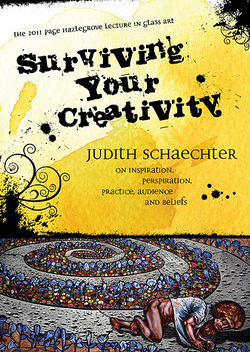
October 03, 2011
Made In Chicago: Drehobl Stained Glass
Made In Chicago: Drehobl Stained Glass, on Newsradio Chicago CBS WBBM - a plug for Chris Drehobl and Rick Purro of Drehobl Glass. I used to work with Rick in the Boston area. Been awhile. It's good to hear that business is doing well and they are getting some nice local press.